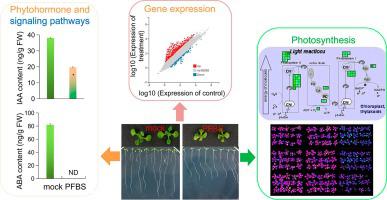Environment International ( IF 11.8 ) Pub Date : 2022-11-17 , DOI: 10.1016/j.envint.2022.107646 Liangliang Sun 1 , Ping Zhang 1 , Fei Liu 1 , Qiong Ju 1 , Jin Xu 1

|
Perfluorobutane sulfonate (PFBS) has oily and hydrophobic characteristics similar to those of perfluorooctane sulfonic acid (PFOS), which is an environmental organic pollutant and has gradually become the main substitute for PFOS in industry. Several studies have revealed the potential toxicity of PFBS in animals. PFBS can be taken up and accumulate in plants; however, whether and how PFBS affects plant growth remain largely unclear. A low concentration of PFBS did not affect plant growth, indicating that it had higher environmental safety than other perfluorinated compounds; however, a high concentration of PFBS (>1 mM) markedly inhibited primary root growth in Arabidopsis thaliana. Subsequently, we investigated the molecular mechanisms underlying plant growth mediated by high concentrations of PFBS. First, a genome-wide transcriptomic analysis revealed that PFBS altered the expression of genes associated with phytohormone signaling pathways. Combining physio-biochemical and genetic analyses, we next demonstrated that PFBS reduced the contents of indole-3-acetic acid (IAA) and abscisic acid (ABA), and disrupted the two signaling pathways in plants, finally inhibiting root growth. Moreover, a high concentration of PFBS also inhibited photosynthesis by comprehensively repressing the expression of genes related to the Calvin cycle and the photosynthetic apparatus. Such an understanding is helpful for elucidating the phytotoxicity of PFBS and provides a new strategy for toxicology research on organic pollutants in plants.
中文翻译:

分子和遗传分析揭示了全氟丁烷磺酸盐的植物毒性
全氟丁烷磺酸盐(PFBS)具有与全氟辛烷磺酸(PFOS)相似的油性和疏水特性,是一种环境有机污染物,逐渐成为工业上PFOS的主要替代品。几项研究揭示了 PFBS 对动物的潜在毒性。PFBS 可以在植物中吸收和积累;然而,PFBS 是否以及如何影响植物生长仍不清楚。低浓度的PFBS不影响植物生长,表明其环境安全性高于其他全氟化合物;然而,高浓度的 PFBS (>1 mM) 显着抑制了拟南芥的初生根生长. 随后,我们研究了高浓度 PFBS 介导的植物生长的分子机制。首先,全基因组转录组学分析表明,PFBS 改变了与植物激素信号通路相关的基因表达。结合生理生化和遗传分析,我们接下来证明 PFBS 降低了吲哚-3-乙酸 (IAA) 和脱落酸 (ABA) 的含量,并破坏了植物中的两种信号通路,最终抑制了根系生长。此外,高浓度的 PFBS 还通过全面抑制卡尔文循环和光合装置相关基因的表达来抑制光合作用。这一认识有助于阐明PFBS的植物毒性,为植物有机污染物的毒理学研究提供新的策略。



























 京公网安备 11010802027423号
京公网安备 11010802027423号